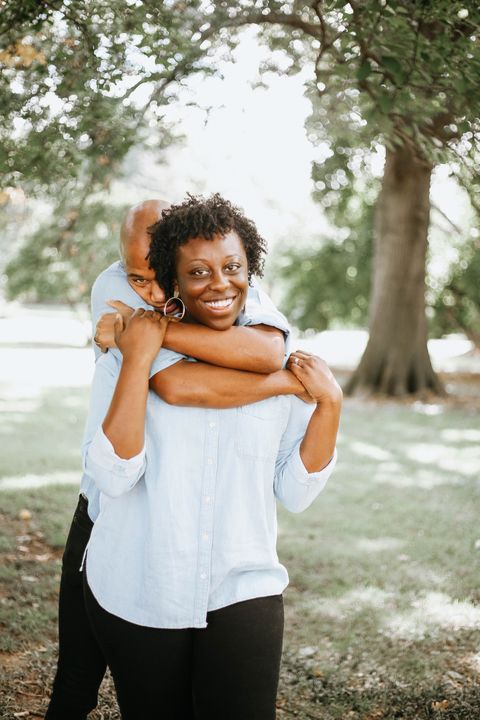Making Relationships Last
Want a more thriving relationship? Sign up here.
Blog
Phone & Privacy Etiquette for Couples
Establishing clear boundaries around privacy is crucial in any relationship. However, couples often struggle with how much privacy is logical, fair, or expected in a healthy relationship.
Should you have the password to your partner's phone? Are 'Find My Phone' and other location trackers thoughtful or invasive? Should you have privacy in a committed romantic relationship at all? These are all valid questions, and many couples struggle with seeing eye to eye when it comes to phone and privacy etiquette.
moreHow to Stay in Love (and attracted to) Your Partner Over the Years
The spark and fire of new love can be nothing short of awe-inspiring. The passion and love can be intense—you can't get enough! As time slips by, though, the fiery spark can wane.
Sometimes, couples seem just as much in love and attracted to one another after many years as they were in the beginning. But ... other times, it can seem like the couple is more like two people who simply choose to live together than romantic partners. What does the former do differently than the latter to keep the fire burning?
It all comes down to several key differences in couples who burn bright despite their years together and ages. Get a closer look at how to stay in love and be physically attracted to your partner over the years.
1. Physical Appearance
Do you remember what it was like when you first met? You likely put effort into your outward appearance because you wanted the other person to see you as attractive. Couples with the power to maintain physical attraction to one another throughout the years tend to never stop trying to look pleasing to their significant...
moreWHY CAN’T YOU BREAK FREE FROM YOUR EX?
Breaking up is like the grand finale of a big life event, complete with high-flying emotions and dramatic exits. But when the show’s over, and you’re left alone on the stage, it’s easy to get stuck obsessing over your ex like they’ll always be the star of the show.
Sometimes, getting over your ex can feel like trying to break free from a grip of emotional quicksand—seriously sticky stuff, especially if you weren’t the one to decide things were over. Unfortunately, getting over the overwhelming sense of longing for the person suddenly deleted from your life can feel a lot like an all-out addiction.
Where do these feelings stem from? Why is letting go so difficult? Take a closer look at why you may feel addicted to your ex.
more5 things you should do if your partner is quiet-quitting your relationship (from Business Insider)
April Eldemire of Couples Thrive was featured in this article from Business Insider. Article reposted with permission.
If your partner is mysteriously distant and checked out when you're together, there's a chance they might be quiet-quitting the relationship.
Just like quiet-quitting a job, quiet-quitting a partnership or marriage involves a person doing the bare minimum to coast in the relationship.
April Eldemire, a licensed marriage and family therapist practicing in Fort Lauderdale, Florida, told Business Insider that common signs include your partner "avoiding connection, avoiding conflict, not making an effort, and...
more3 Subtle Signs You Can't Trust Your Partner- Even If They Seem Super Committed (from Business Insider)
April Eldemire of Couples Thrive was featured in this article from Business Insider. Article reposted with permission.
Sometimes, the most emotionally mature-seeming partners might not be trustworthy.
April Eldemire, a licensed marriage and family therapist practicing in Fort Lauderdale, Florida, said there are overt red flags of untrustworthiness that many people know to spot already — like being secretive about social media or their phone.
But even if a person freely posts you on their grid and always shows up, there are still reasons you might not trust them or feel secure in the relationship, Eldemire told Business Insider.
“A person can show up and be engaged in your life, but not volunteer any of their own sense...
moreBreaking the Cycle: How to Stop Being Negative in Your Relationship
Many of us have been there.
You bring up an issue with your partner, and you feel attacked by their response. You get defensive and return fire—only for them to do the same. It’s a battle that no one can win.
Thankfully, it doesn’t have to be this way.
Making small shifts to your mindset can work wonders in your relationship. Here, we’ll take a look at why negativity can ruin a relationship and explore small daily steps that you can take to help you and your partner move to a more positive headspace.
moreThe Three B's to Discuss With Your Spouse This Holiday Season
Want your holiday season to stay merry and bright this year? Here’s a basic rule to keep in mind:
Make sure you and your spouse are on the same page when it comes to the big topics!
By “big topics,” I really mean any issue that has the potential to be a major source of stress for you and your partner. And really, take your pick: between work and social commitments, family schedules, finances, grief (which can surge during this time of year, especially if you’ve experienced a recent loss), and even our own expectations, there are plenty of things that come up during the holidays that can drain us emotionally and strain our relationship.
That said, throughout my career as a licensed marriage and family therapist, I’ve noticed three specific topics—I call them “the three B’s”—that frequently stir up a lot of challenge for couples during the holidays. And in my professional opinion, it is super helpful to discuss and come to an agreement about these three topics before the holidays get into full swing.
The topics are:...
moreLove Bombing: What Is It, How to Recognize It, and What to Do About It
Ever heard the saying, “If it’s too good to be true, it probably is”? This is exactly the case when it comes to love bombing, a term that the Cleveland Clinic refers to as “a form of psychological and emotional abuse [that] is often disguised as excessive flattery.”
In this article, you’ll learn more about what love bombing is, what it looks like within a relationship, and how to deal with it.
moreSigns of True Love: How to Differentiate Genuine Feelings from Infatuation
Infatuation vs genuine feelings of love: think you can spot the difference?
If you’re in the newest stages of a relationship, this actually might be hard to do! But being able to recognize the difference between these two opposing emotional states can be helpful for making sure you’re entering (and staying in) a relationship with someone for the right reasons.
moreWhy do people choose partners who trigger past wounds?
You hear it all the time (and maybe you’ve even lived it yourself):
- A person dates (and breaks up with) the same type of person over and over again.
- They always seem to enter relationships with people who aren’t “right” for them, or who exhibit traits—particularly negative ones—that are eerily similar to traits exhibited by prior partners.
- Try as they might, they just can’t seem to help but be drawn to relationships that will have them repeating the same type of challenges and conflicts over and over (e.g., infidelity, emotional or physical abuse, codependency, etc.).
Is this relationship déjà vu some kind of character failing of the individual—or is it something else? Let’s explore a few reasons why so many of us end up with people who resemble ex-partners and even tend to trigger our past emotional wounds.
moreAre you easily offended? Let's talk why—and what to do about it
Maybe you don’t get offended easily. If so, kudos!
Or maybe…
- You already know you get offended easily (even if it’s just about one specific topic or issue), and it’s something you’re ready to address
- You suspect you’re more sensitive than others and wonder whether there’s something you can do about it
- You’ve never considered that your short fuse is a personal hiccup that might be holding you back in life and relationships…until now
Whatever the case may be, I’ll argue that being the type of person who is easily offended creates a lot of unnecessary stress, conflict, and drama in life. And if this resonates with you or someone you know, this article can help you understand where that quick-to-take-offense comes from and what can be done about it.
moreHi, I'm a healthy relationship. Let's get to know each other!
Hi! I’m a healthy relationship.
I might not look exactly like what you had in mind. In fact, I might even look quite different when I’m with different couples, depending on those individuals’ personalities and preferences. And I can even change and evolve over time with the same two people!
But there are some important traits and characteristics that you’ll definitely notice about me.
moreHelp! I'm Feeling Disconnected From My Partner—Now What?
Feeling connected with your spouse or partner isn’t just important—it’s kind of the whole point.
To wit, decades of research confirm that being in a committed, long-term relationship or marriage is good for your physical and mental health, and that strong social connections benefit your quality of life and length of life.
It follows, then, that feeling disconnected from your partner, for whatever reason, can be incredibly uncomfortable and stressful. In this article, let’s talk about why feeling disconnected from your spouse might happen, how to recognize it, and what to do (and maybe not do) about it.
moreHow to get over a situationship
A “situationship” is a romantic and/or sexual relationship that isn’t formally defined. You may know it by its other pop culture references like “friends with benefits,” “fun buddies,” or “booty call.” People in situationships generally aren’t exclusively committed to each other and typically aren’t expected to fork over a ton of emotional investment.
But while this casual, noncomittal intimacy may have its benefits for some people at certain stages in their lives, situationships also have their fair share of conflict a
nd uncertainty—and can be painful to walk away from.
Here are three things that can help you move on once you or your “friend with benefits” decides to end your situationship.
moreWhy emotional intimacy and sexual intimacy go together
Intimacy—that feeling of closeness, connectedness, and togetherness shared between people—is one of the most important and rewarding components of a healthy romantic relationship. When I work with couples who want to improve their marital satisfaction, I always end up referring to both types of intimacy that you hear about: physical (or sexual) intimacy and emotional intimacy.
What this means is:
- For the couple who say sex is great but they feel distant from each other, we use therapy as an opportunity to explore emotional and physical intimacy.
- For the couple who say they feel a deep sense of love and appreciation for each other, but that their sex life has fizzled to the point that their relationship borders on platonic, we (you guessed it) use therapy as an opportunity to explore emotional and physical intimacy.
I lay this out simply to show that both types of intimacy truly are essential. Here are three things I consider to be important truths about physical and...
moreThree warning signs of one-sided or unreciprocated love
I love the paradigm that a healthy marriage doesn’t require 50/50 from both partners—it requires 100/100. This means that each partner gives their best effort to help the relationship to thrive.
Now, this doesn’t mean our 100% effort will be the exact same moment to moment and day to day. We can’t always “crush it,” simply because our best efforts change depending on innumerable factors—from how much sleep we got last night to whether we’re feeling triggered by something that touches on an unaddressed childhood trauma.
The good news is that in a healthy relationship where both partners make an equal, honest effort to make things work, these fluctuations are totally survivable. Healthy partners see themselves as teammates, and they support each other accordingly—they “pick up the slack,” so to say, when necessary.
moreDo I have an anger problem?
Let’s face it: anger is uncomfortable.
Feeling angry, “seeing red,” or “boiling over” usually doesn’t feel good for you and sometimes even for the people around you, including your spouse.
But here’s something to note:
Anger in its own right isn’t necessarily a “problem.” In fact, feeling angry is often a perfectly normal response to certain events or situations in your life, and can even help motivate you to get active, get creative, and find some solutions! For these reasons and more, repressing anger, thinking you “shouldn’t” be feeling it, or otherwise ignoring it is neither necessary nor helpful.
The “problem” with anger happens when the emotion assumes full control over your behaviors and actions, or when your anger becomes excessive. Would you be able to tell if your anger—or your spouse’s anger—has reached this point? Let’s talk about it.
moreDon't stop having fun with your spouse!
Fun is FUN! That in itself is reason enough to make sure that play, fun, and joyful experiences are regular components of your marriage.
When you’re in a committed relationship, having fun with your partner is also a big help when it comes to preventing or improving complacency, burnout, stress, anxiety, depression, and related issues. Research has even found that couples report increased relationship satisfaction after spending time together doing novel and stimulating activities.
Your takeaway? Never stop finding ways to have fun with each other, no matter how long you and your spouse have been together!
moreAre You Living With a Narcissist?
“Narcissism.” The word is a mainstay in modern day cultural lexicon, and rooted in the fictional character Narcissus, from a myth by first century Roman poet Ovid about a man who was cursed by the gods and made to fall in love with his own reflection.
These days, the term “narcissism” is thrown around quite a lot. People in the public and private eye are frequently labeled as “narcissists.” This is hugely problematic, as far as I’m concerned, because in reality, real narcissism is quite rare—and let’s be thankful for that.
In fact, according to Psychology Today, only about 1% of the population are TRUE narcissists. What does “true narcissist” mean exactly? And what do we do if we know someone who is either a true narcissist or simply exhibits narcissistic traits and tendencies? Let’s discuss.
moreStaying Connected in a Digitally Disconnected World: Guidelines for the Healthy Couple
Social media is definitely a double-edged sword.
On the one hand, social media helps us connect to loved ones, expand our social and professional networks, share information, and discover new products, brands, and ideas that we may never have found otherwise. On the other hand, social media has been linked to destructive feelings like loneliness, narcissism, and low self-esteem.
For the romantic relationship, social media can be especially harmful. Couples who don’t use social media wisely often struggle with jealousy and unhealthy expectations. When we only see other people’s (or other couples’) carefully curated highlight reels, it’s easy to start playing the comparison game—a recipe for resentment and “the grass is greener” fallacy.
Undisciplined social media use can also drive a wedge between romantic partners and erode the all-important sense of connection and trust. According to...
more























